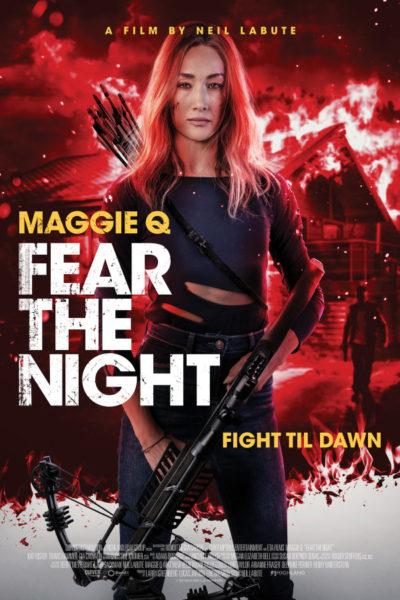 ★★
★★
“Entertainment: Impossible”
The Great 2023 Void of Action Heroines continues on. The closest thing we’ve seen to one as a mainstream hit in the cinemas is… um, Barbie. Yeah. Not going there. I was looking at the box-office chart for the year, and excluding movies which were actually released in 2022 e.g. Everything Everywhere All at Once, there is only one single film in the top two hundred we have covered here. Polite Society sits outside the top hundred, at $1,.5m [We will get round to The Wrath of Becky in a bit. It’s #181, with a gross of $168,109.] Last year, we had Everything and The Woman King in the top thirty. 2021 gave us Black Widow; 2020, Birds of Prey and Wonder Woman 1984. The complete lack of tentpole heroines this year is disconcerting.
There has been no shortage of female supporting characters who have kicked butt. We already wrote about the The Women of Mission: Impossible, while John Wick 4 also delivered in this category, among quite a few other successful movies. But if you want to see a GWG take centre-stage, you will not find it in the movies. In some ways, it’s more convenient, to be able to sit at home, in your own comfy chair, with a choice of reasonably-priced snacks, and simply push a button on your remote control. But, it has to be said: quality wise, there’s often a good reason most of these films have gone straight to a streaming service. We’ve already covered a number here. The Mother. Furies. Mercy Falls. True Spirit. Some were decent. Yet none have achieved a seal of approval.
 This one certainly won’t, barely reaching the level of acceptable entertainment, and sadly, continuing Gal Gadot’s streak of swings and misses. She blazed onto the scene in Wonder Woman back in 2017, and seemed set to take over the mantle as one of the top action actresses in Hollywood. But she has singularly failed to build on that foundation. She lost a lot of public goodwill for her tone-deaf Imagine video in the pandemic. WW84 was a flop, Red Notice was a quickly-forgotten Netflix Original, and her turn in Death on the Nile was widely-panned, becoming a meme. This, however, was a chance to correct course, putting her front and centre in a movie which, it was clearly hoped, would kick-start a franchise and become the female version of Mission: Impossible.
This one certainly won’t, barely reaching the level of acceptable entertainment, and sadly, continuing Gal Gadot’s streak of swings and misses. She blazed onto the scene in Wonder Woman back in 2017, and seemed set to take over the mantle as one of the top action actresses in Hollywood. But she has singularly failed to build on that foundation. She lost a lot of public goodwill for her tone-deaf Imagine video in the pandemic. WW84 was a flop, Red Notice was a quickly-forgotten Netflix Original, and her turn in Death on the Nile was widely-panned, becoming a meme. This, however, was a chance to correct course, putting her front and centre in a movie which, it was clearly hoped, would kick-start a franchise and become the female version of Mission: Impossible.
Ain’t gonna happen.
Two minutes in, Chris turned to me and said, “Is this a movie or a TV series?” and I can see her point. Having watched this just a couple of weeks after the undeniably cinematic Mission: Impossible – Dead Reckoning Part One, the difference is obvious. Harper directed The Aeronauts, which was decent enough, but it seems he is incapable of scaling things up from a balloon basket, to the much larger scope needed here. Part of the problem with the action sequences in particular, is the VR enhancement gimmick the heroine wears, allowing her to get real-time updates from her handler. This too often leaves everything looking like it’s a video-game, and it rubs off on other sequences, such as her parachute jump, which feels thoroughly unconvincing.
The plot is perhaps an even greater weakness, a confusing and unengaging mess. Rachel Stone (Gadot) works for a group called Charter, who use hi-tech surveillance for good (yeah… about that…). She’s embedded as an agent in MI-5, for reasons that are never made clear. Wouldn’t you know it, one of the people on her team, Parker (Dornan), turns out to be plotting to steal The Heart, the super-computer on which Charter relies for their surveillance – and use it, presumably, not for good. He has teamed up with talented young hacker Keya Dhawan (Bhatt) to this end, and only Stone can stop them, recover The Heart, and save her colleagues at Charter, including Stone’s boss Nomad (Okenedo).
 Dear god, I almost lost consciousness merely typing the previous paragraph. Reviewing the previous work of writers Greg Rucka and Allison Schroeder, what stands out is an almost complete lack of action movies. Rucka has worked mostly in comics (including the one which became The Old Guard), while Schroeder did, um, Christopher Robin and Hidden Figures. The lack of experience shows. Never mind not having written an action movie, it feels as if neither of them had seen an action movie. If so, they might have realized Stone’s handler flicking VR screen around by gesture, was done twenty years ago in Minority Report. The good ideas here are all like that, things you’ve seen elsewhere, and done better, while the ones the movie can call its own are uninspired in concept and/or execution.
Dear god, I almost lost consciousness merely typing the previous paragraph. Reviewing the previous work of writers Greg Rucka and Allison Schroeder, what stands out is an almost complete lack of action movies. Rucka has worked mostly in comics (including the one which became The Old Guard), while Schroeder did, um, Christopher Robin and Hidden Figures. The lack of experience shows. Never mind not having written an action movie, it feels as if neither of them had seen an action movie. If so, they might have realized Stone’s handler flicking VR screen around by gesture, was done twenty years ago in Minority Report. The good ideas here are all like that, things you’ve seen elsewhere, and done better, while the ones the movie can call its own are uninspired in concept and/or execution.
It doesn’t help that the supporting cast are mostly bland. If Gadot does still have reasonable charisma, Dornan is completely forgettable. Bhatt is a thoroughly unconvincing hacker – I might trust her to reset my account password, and apologize for the inconvenience. That’s about it. The most irritating character though, is probably her handler. I get what they were going for, but almost every time he’s involved, it leaves the heroine feeling not much more than a meat-puppet, removing a significant degree of agency from her. I will say, some of the action set-pieces aren’t too bad. There’s a good car-chase through Lisbon, for example. But any secret organization which fills its airship with hydrogen, is certainly not going to remain secret for very long. That’s the level of idiocy we are dealing with in the writing here.
Long before the end, I had mentally checked out, as the film globe-trotted manically from [checks notes] the Alps to London to Portugal to Senegal to Iceland. There’s no denying there was a significant amount of resources expended on this production, though Netflix is notoriously tight-lipped on specific budgets. However, the film doesn’t so much jump the shark, as use it for a 3000-metre steeplechase, when the MI-5 spies have a dance break. Read the sentence again. Roll it around your brain. That it’s to a Lizzo song – unfortunate timing, that – makes it considerably worse. Everything thereafter feels like a waste of those resources, as well as the variable talents of those involved.
Dir: Tom Harper
Star: Gal Gadot, Jamie Dornan, Alia Bhatt, Sophie Okonedo
 Director LaBute is best known around these parts for his ill-conceived remake of classic horror The Wicker Man, which is generally regarded as spectacularly bad, and is probably best-known for spawning memes involving Nicolas Cage and bees. So expectations going into this were… not high, shall we say. On that basis, the three-star rating is something of a pleasant surprise, though most of the credit for this should got to its star, rather than the director. Tess (Q) is a veteran of the war in Iraq, who is struggling to reconnect to her two sisters. Rose is getting married, and is nice enough that Tess is willing to attend her bachelorette party at the family cabin, deep in the country. But Beth (Foster) is a straight-up bitch.
Director LaBute is best known around these parts for his ill-conceived remake of classic horror The Wicker Man, which is generally regarded as spectacularly bad, and is probably best-known for spawning memes involving Nicolas Cage and bees. So expectations going into this were… not high, shall we say. On that basis, the three-star rating is something of a pleasant surprise, though most of the credit for this should got to its star, rather than the director. Tess (Q) is a veteran of the war in Iraq, who is struggling to reconnect to her two sisters. Rose is getting married, and is nice enough that Tess is willing to attend her bachelorette party at the family cabin, deep in the country. But Beth (Foster) is a straight-up bitch.




 By coincidence, I watched this not longer after the not very good
By coincidence, I watched this not longer after the not very good  I was going to go with “Tree’s company” as the tagline, before I realized I’ve actually used that in three separate, forest-set movies. So I decided to adjust it slightly, and what’s above is indeed very apt. There is a cast of three (3) and the entire thing unfolds in the woods. There isn’t a single set or interior shot in the whole film. Indeed, if you’d asked me, I’d have said this had all the hallmarks of a COVID-era project, designed to be shot with a small cast and in a nicely sanitary, outdoor location. Not so, even though Tubi dates it as 2020. There was a screening in April 2019, well before anyone had heard of Wuhan, and the IMDb gives it a year of 2017.
I was going to go with “Tree’s company” as the tagline, before I realized I’ve actually used that in three separate, forest-set movies. So I decided to adjust it slightly, and what’s above is indeed very apt. There is a cast of three (3) and the entire thing unfolds in the woods. There isn’t a single set or interior shot in the whole film. Indeed, if you’d asked me, I’d have said this had all the hallmarks of a COVID-era project, designed to be shot with a small cast and in a nicely sanitary, outdoor location. Not so, even though Tubi dates it as 2020. There was a screening in April 2019, well before anyone had heard of Wuhan, and the IMDb gives it a year of 2017. I had quite forgotten that Rose was part of John Wick: Chapter 2 in 2017. That
I had quite forgotten that Rose was part of John Wick: Chapter 2 in 2017. That  I can’t recall seeing an action heroine movie with
I can’t recall seeing an action heroine movie with  Buffalo police officer Megan (Sadeghian) is a highly-skilled cop, but has a crisis of confidence after being involved in the accidental shooting of a colleague. To help get her out of that mindset, partner Jeremy (Johnson) invites Megan on a weekend camping getaway in upstate New York, along with another couple. This goes horribly wrong, after they stumble across the summary execution of a drug-dealer by the local sheriff, Preacher (Kennedy) and his death squad. The four campers are now a problem for Preacher, so he seals off the area, and unleashes a slew of hunters, putting a ten thousand dollar bounty on the head of each target. Of course, you don’t have to be psychic to see it won’t be easy, courtesy of Megan.
Buffalo police officer Megan (Sadeghian) is a highly-skilled cop, but has a crisis of confidence after being involved in the accidental shooting of a colleague. To help get her out of that mindset, partner Jeremy (Johnson) invites Megan on a weekend camping getaway in upstate New York, along with another couple. This goes horribly wrong, after they stumble across the summary execution of a drug-dealer by the local sheriff, Preacher (Kennedy) and his death squad. The four campers are now a problem for Preacher, so he seals off the area, and unleashes a slew of hunters, putting a ten thousand dollar bounty on the head of each target. Of course, you don’t have to be psychic to see it won’t be easy, courtesy of Megan. If 2023 has been underwhelming on the theatrical front (to put it mildly), the various streaming services have certainly had no shortage of entries to keep us occupied here. This one comes to us from Paramount+, and stars Saldaña – already known around these parts, most likely for
If 2023 has been underwhelming on the theatrical front (to put it mildly), the various streaming services have certainly had no shortage of entries to keep us occupied here. This one comes to us from Paramount+, and stars Saldaña – already known around these parts, most likely for  Not to be confused with
Not to be confused with  Much though I love the streaming service, even I have to admit that “Tubi Originals” are a bit of a mixed bag, to put it mildly. For every
Much though I love the streaming service, even I have to admit that “Tubi Originals” are a bit of a mixed bag, to put it mildly. For every  ★★
★★ This one certainly won’t, barely reaching the level of acceptable entertainment, and sadly, continuing Gal Gadot’s streak of swings and misses. She blazed onto the scene in
This one certainly won’t, barely reaching the level of acceptable entertainment, and sadly, continuing Gal Gadot’s streak of swings and misses. She blazed onto the scene in  Dear god, I almost lost consciousness merely typing the previous paragraph. Reviewing the previous work of writers Greg Rucka and Allison Schroeder, what stands out is an almost complete lack of action movies. Rucka has worked mostly in comics (including the one which became
Dear god, I almost lost consciousness merely typing the previous paragraph. Reviewing the previous work of writers Greg Rucka and Allison Schroeder, what stands out is an almost complete lack of action movies. Rucka has worked mostly in comics (including the one which became